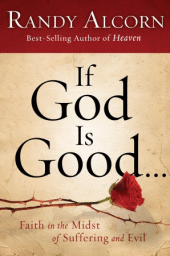Review: If God Is Good


The first thing you notice about this book – If God Is Good: Faith in the Midst of Suffering and Evil – is its size. Weighing in at 512 pages, it’s far from the small books that you sometimes find in Christian bookstores. Books this size are usually either novels or academic works. Not this book, though. It’s theological, but not just academic. It’s written for anyone who is wrestling with the question of how evil and suffering can coexist with a God who is both good and powerful.
If you’ve wrestled with this question, you know it’s a theological one. There are all kinds of issues to work through: the nature of good and evil, divine sovereignty and human choice, for example. The theodicy question is not an easy one, and it takes some skill to navigate the issues.
But this question is also a practical one. If evil and suffering only presented an intellectual problem, it would be one thing. But what do you say to a rape victim, or a parent whose baby has died, or to a cancer patient who is facing death?
If God Is Good is one of those rare books that manages to be both theological and practical at the same time. Of course, this is how theology is supposed to be, but not every book pulls it off. Alcorn deals with all the theological issues, but also offers stories that illustrate how others have confronted suffering. He also writes as someone who has clearly experienced suffering himself, and as a result the applications he offers are both practical and helpful.
“I hope you are finding help from reading If God is Good,” he writes, “but I also hope it’s clear that I’m not proposing shrink-wrapped answers. There are none.”
I would recommend this book to someone who is suffering and looking for biblical insight. It’s theological and helpful and avoids glib answers to complex questions. It’s a little big for someone who is not a reader, but it’s clearly organized so that someone can find what they need in the book even if they don’t read it all the way through.
But I would also recommend this book in general because we all need to grapple with these issues. Alcorn writes:
We should teach our families and churches a theology of suffering.
Read with your children the whole Bible, including its many accounts of evil and suffering (the age appropriate ones). Talk with them about troubling news stories and sick people you know. Prepare your children for life and death. Pass on to them a great gift: a biblical worldview.
Those without a biblically grounded theology of suffering are always just one accident, disease, disability, natural disaster, or combat fatality away from losing their faith. Children absorb their parents ‘worldview. If they haven’t seen a durable, realistic, and biblical response to suffering in their parents – or if they lack the worldview framework to interpret evil and suffering – then during college or before, they will ultimately slide into other worldviews, such as naturalism, materialism, atheism, agnosticism, or false religion.
I’d also recommend this book to pastors. There are tons of helpful illustrations and resources in this book. I’ve made references in the back to help me find illustrations and quotes on the topics covered in this book.
Every one of us will experience suffering. Many of us are experiencing it now. We all know others who are suffering. Randy Alcorn helps us confront the questions of suffering in a theologically accurate and practical way. I highly recommend this book.
Find out more at Random House | Amazon.com






